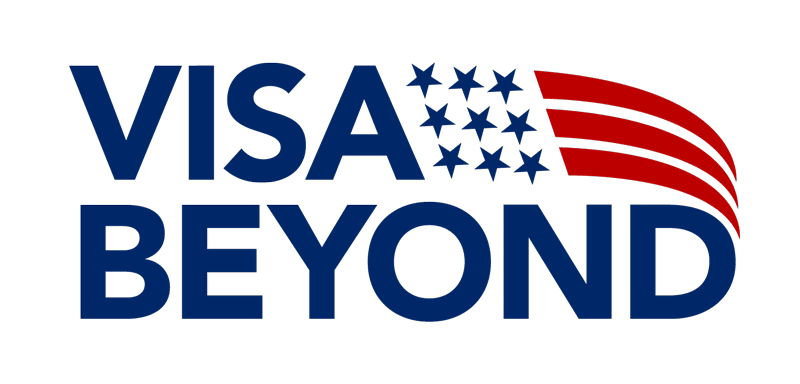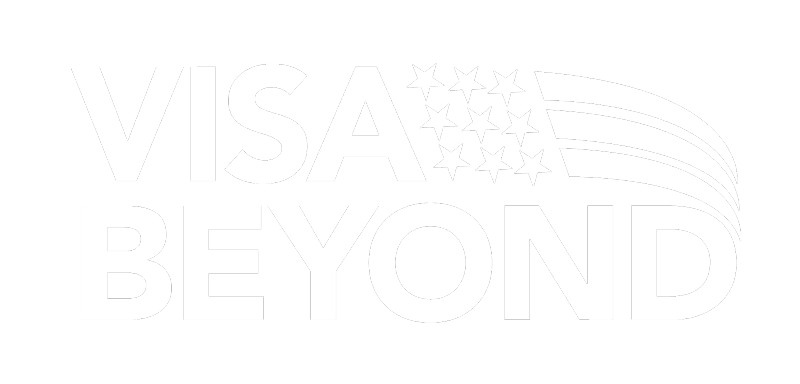International
Entrepreneur Rule:
U.S. Startup Visa Guide.
The International Entrepreneur Rule (IER) allows foreign entrepreneurs to stay in the U.S. temporarily to grow their startups that demonstrate potential for growth and job creation.
The International Entrepreneur Rule allows foreign entrepreneurs to stay in the U.S. for up to 30 months if they have substantial ownership and significant U.S. funding.
Temporary Stay
Allows 30-month stays to
grow startups in the U.S.
Renewable Stay
Stay can be extended
based on business success.
No Visa Needed
Alternative to traditional visa
paths for entrepreneurs.
Access to U.S. Investors
Connect with U.S.
investors and markets.
Economic Impact
Encourages job creation
and innovation in the U.S.
Client
Satisfaction
Years
in the business
What is the
U.S. Startup Visa?
The U.S. Startup Visa, under the International Entrepreneur Rule (IER), allows foreign entrepreneurs to temporarily live and work in the U.S. to build and grow their startups.
Introduction to the U.S. Startup Visa
(International Entrepreneur Rule)
(International Entrepreneur Rule)
The International Entrepreneur Rule (IER) was created to support foreign entrepreneurs with high-potential startups that can contribute to the U.S. economy. Instead of a formal visa, the program offers parole, allowing eligible entrepreneurs to live in the U.S. for up to 5 years to work on their startup.
Key Points of the U.S. Startup Visa
- Entrepreneurs must have significant ownership in a startup.
- The startup must have secured U.S. funding or government grants.
- The startup must demonstrate potential for rapid growth and job creation.
IER Funding Requirement.
Under the International Entrepreneur Rule, foreign entrepreneurs must secure 75% of their total funding from qualified U.S. investors, such as venture capital firms, angel investors, or startup accelerators. This requirement ensures that applicants have significant U.S.-based financial backing, underscoring their startup’s viability and growth potential within the U.S.
00%
from qualified
U.S. investors
IER Application Costs and Processing Timeline
An overview of fees and processing times for applying to the International Entrepreneur Rule (IER) program.
Application Fees
- Form I-941 Fee: $1,200
- Biometrics Fee: $85
Application Timeline
- Initial Processing Time: 3 to 6 month
- Initial Stay Duration: 3 years
- Extension Option: 2-year extension if eligible
FAQs
About IER.
What Happens After My IER Parole Expires?
If your IER parole expires, you must either:
- Apply for renewal if eligible, or
- Transition to another visa or leave the U.S.
Can I Bring My Family to the U.S. Under the U.S. Startup Visa?
Yes, you can bring your spouse and unmarried children under 21. Your spouse can also apply for work authorization.
Do I Need a Lawyer to Apply for the U.S. Startup Visa?
It’s not required, but hiring an immigration lawyer can help ensure your application is complete and increase your chances of approval.
How Many Entrepreneurs Can Apply for Parole Under One Startup?
Up to three entrepreneurs from the same startup can apply for parole under the U.S. Startup Visa, provided each meets the eligibility criteria.
Clients we
work for.
















Difference Between a Visa and Parole
The U.S. Startup Visa (IER) is technically not a visa but a parole program. Here’s a quick comparison between a visa and parole:
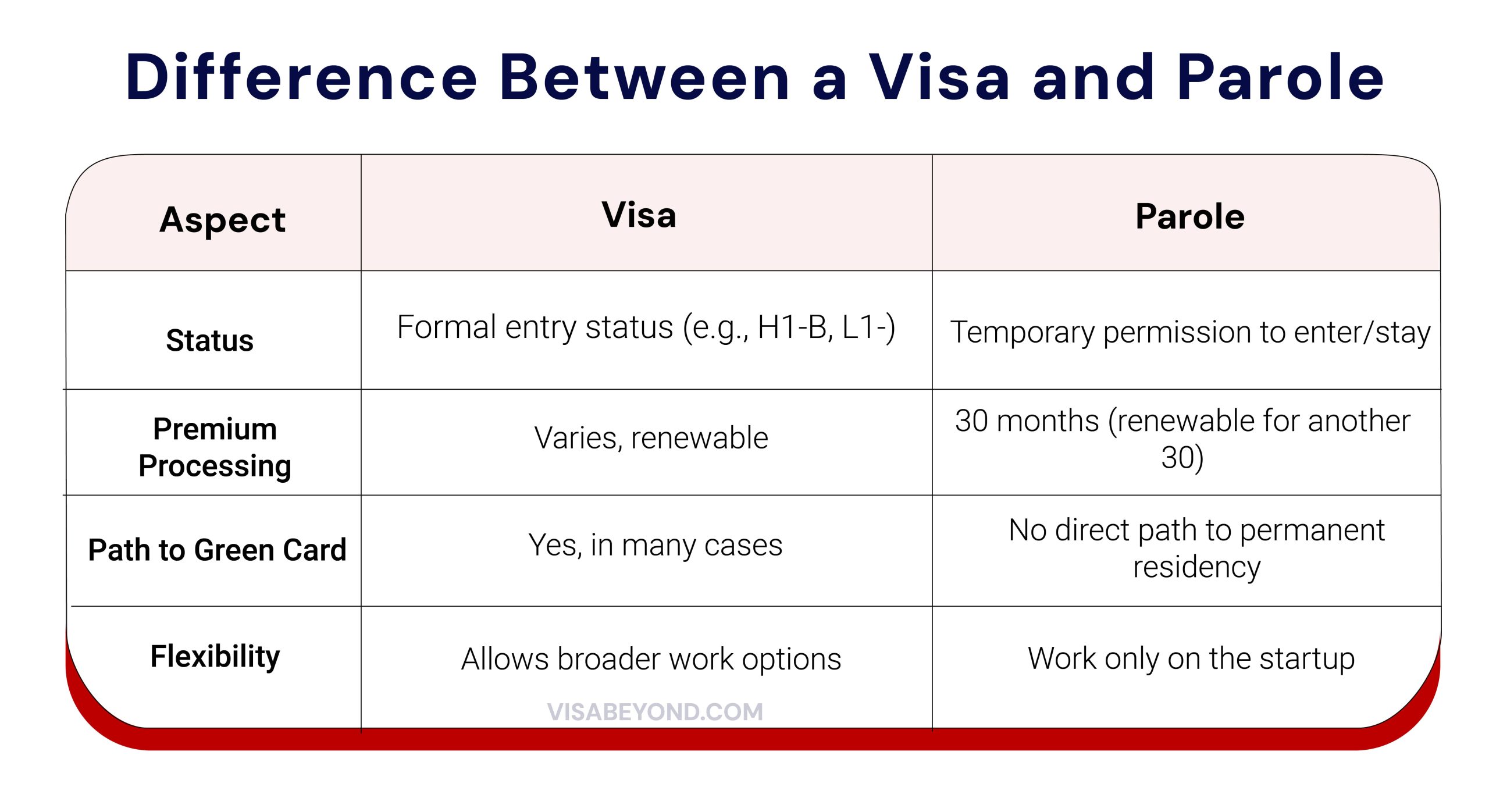
Key Benefits of the U.S. Startup Visa
The U.S. Startup Visa offers several benefits that make it an attractive option for foreign entrepreneurs:
- Opportunity to Scale a Startup in the U.S.: The world’s largest market offers access to talent, funding, and customers.
- No Visa Lottery or Quotas: Unlike H-1B or other work visas, there are no limits on the number of entrepreneurs who can apply.
- Spouse Work Authorization: Your spouse can also apply for work authorization in the U.S.
- Extended Stay: Stay in the U.S. for up to 5 years, with the possibility of renewing your status based on business growth.
Eligibility Criteria for the U.S. Startup Visa
To qualify, entrepreneurs must meet specific requirements related to ownership, funding, business activity, and more.
What You Need to Know About Startup Ownership Requirements
You must:
- Own at least 10% of your startup at the time of application.
- Continue to own at least 5% if you apply for renewal after 30 months.
Example: If your startup has multiple co-founders, each founder applying for the U.S. Startup Visa needs to meet the ownership threshold individually.
Minimum Investment Needed for U.S. Startup Visa
To qualify, your startup must secure a certain amount of external funding. This funding can come from:
- U.S. investors
- Government grants
Qualifying Investors and Funding Sources
To meet the investment requirements, you must receive funding from:
- Venture Capitalists: Must be accredited and have a track record of investing in startups.
- Angel Investors: Must be reputable and U.S.-based.
Example: If you receive a $300,000 investment from a well-known U.S. angel investor, you meet the qualification criteria.
Types of Government Grants That Qualify
You can also meet the funding requirement by securing at least $100,000 in grants or awards from:
- U.S. Federal Agencies (e.g., Small Business Innovation Research (SBIR) program)
- State or Local Government Programs
Example: Winning a $120,000 grant from a state-run entrepreneurship program would qualify your startup.
Active Role in Your Startup: What Does It Mean?
To qualify, you must have a central and active role in your startup’s operations. This means:
- Being involved in strategic decision-making.
- Managing day-to-day activities of the business.
Example: If you are a passive investor, you are not eligible. However, if you are the CEO or actively lead business functions, you meet this requirement.
Business Growth Potential Requirements
Your startup must demonstrate potential for:
- Rapid growth.
- Job creation for U.S. workers.
Indicators:
- A scalable business model.
- Strong customer acquisition or revenue growth projections.
Example: A tech startup with the potential to hire software engineers in the U.S. or expand rapidly through funding would meet the requirement.
Which Countries Are Eligible?
Unlike some visas (e.g., E-2 investor visa), the US Startup Visa has no nationality restrictions. Entrepreneurs from any country can apply, making this option accessible to a broader audience.
Step-by-Step Guide to Applying for IER
Here’s how to apply for the U.S. Startup Visa under the International Entrepreneur Rule.
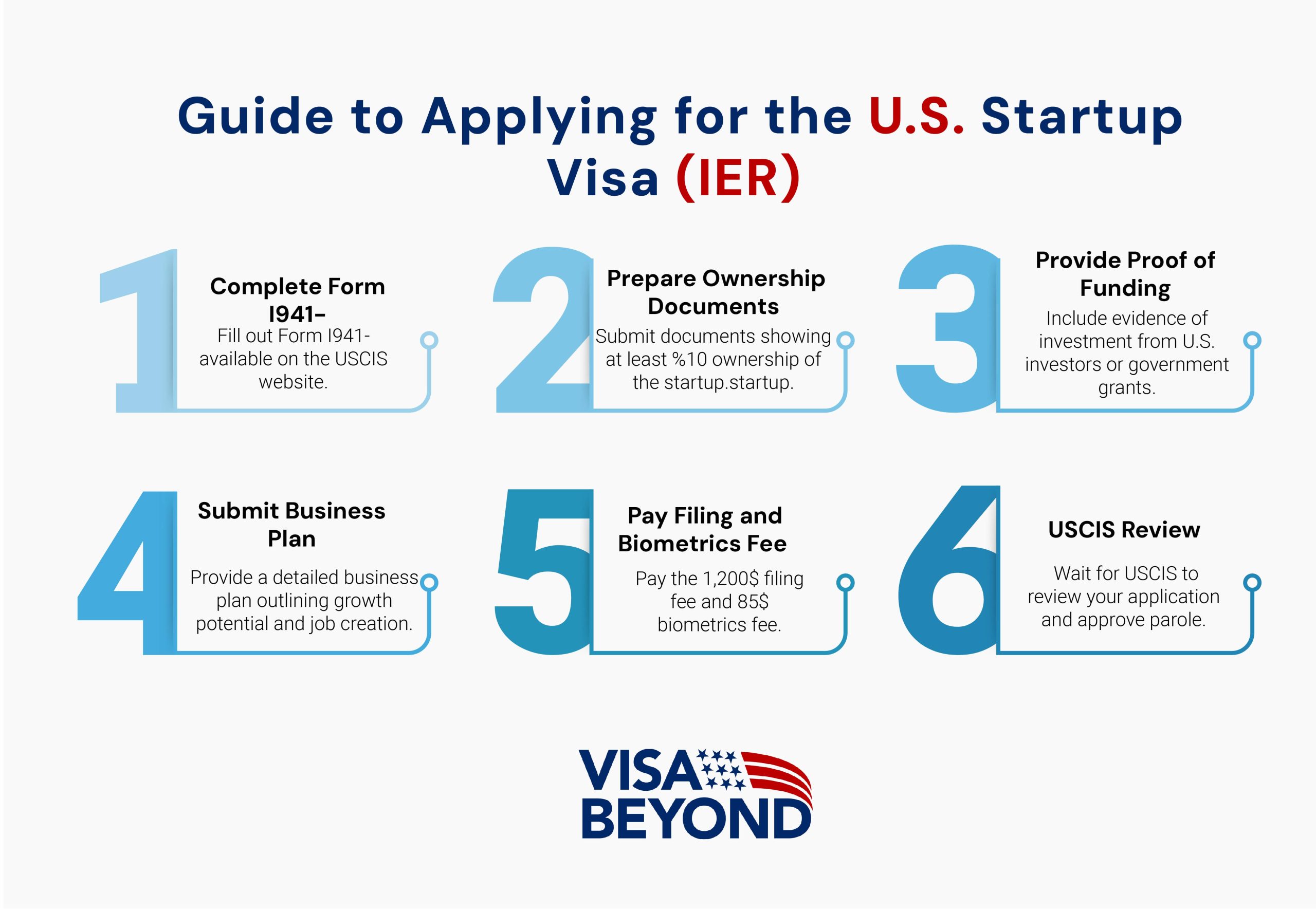
How to File Form I-941 for Entrepreneur Parole
The process begins with filing Form I-941 with USCIS. Here’s what you need to do:
- Complete the Form I-941:
- Available on the USCIS website.
- Prepare Required Documents:
- Proof of ownership (e.g., incorporation documents).
- Evidence of funding (e.g., term sheets, bank statements).
- Business plan demonstrating growth potential.
Filing Requirements and Supporting Documents
Here’s a checklist of required documents:
- Proof of Ownership: Startup incorporation documents.
- Funding Proof: Contracts, grant award letters.
- Business Plan: Detailed description of the business’s mission, growth strategy, and job creation plan.
- Fee Payment: $1,200 filing fee + $85 biometrics fee.
Once you submit Form I-941 with the required documents and fees, USCIS will review the application, and if approved, you can proceed with entering the U.S.
Processing Time for the IER Application
The processing time depends on the volume of applications and the specific details of each case. Typically, you can expect the process to take:
- Initial Review: 4 to 6 months for USCIS to review your Form I-941 application.
- Request for Evidence (if needed): Additional 2 to 3 months, depending on complexity.
- Total Processing Time: It can range from 6 to 10 months before receiving approval or denial.
How Much Does It Cost to Apply for the U.S. Startup Visa?
Here’s a breakdown of the costs involved in applying for the U.S. Startup Visa (IER):
- Filing Fee (Form I-941): $1,200
- Biometrics Fee: $85
- Additional Costs: Legal fees (if you hire an attorney), translation services (if needed for documents)
- Total Cost Estimate: Approximately $1,285 excluding any optional services.
Biometrics Requirements and Application Fees
After filing Form I-941, you will be required to complete biometrics, which includes fingerprinting and a photo. This is used to verify your identity and conduct background checks.
- Biometrics Fee: $85
- Where to Complete Biometrics: You’ll receive a notice to attend a USCIS Application Support Center.
Example: After filing your application, you’ll receive an appointment to provide your biometrics within 30 days. You must attend to keep your application moving forward.
What Happens After You File?
Once you’ve filed your Form I-941, here’s what happens next:
- Receipt Notice: USCIS will send you a confirmation that your application has been received.
- Biometrics Appointment: Attend your biometrics appointment.
- USCIS Review: USCIS will review your application. If additional information is needed, they’ll issue a Request for Evidence (RFE).
- Decision: Once reviewed, you’ll either receive:
- Approval: You can now apply for travel documents to enter the U.S.
- Denial: You may reapply or explore other visa options.
Entering the U.S. Under IER
Once your parole application is approved, you’ll need to follow specific steps to enter the U.S.
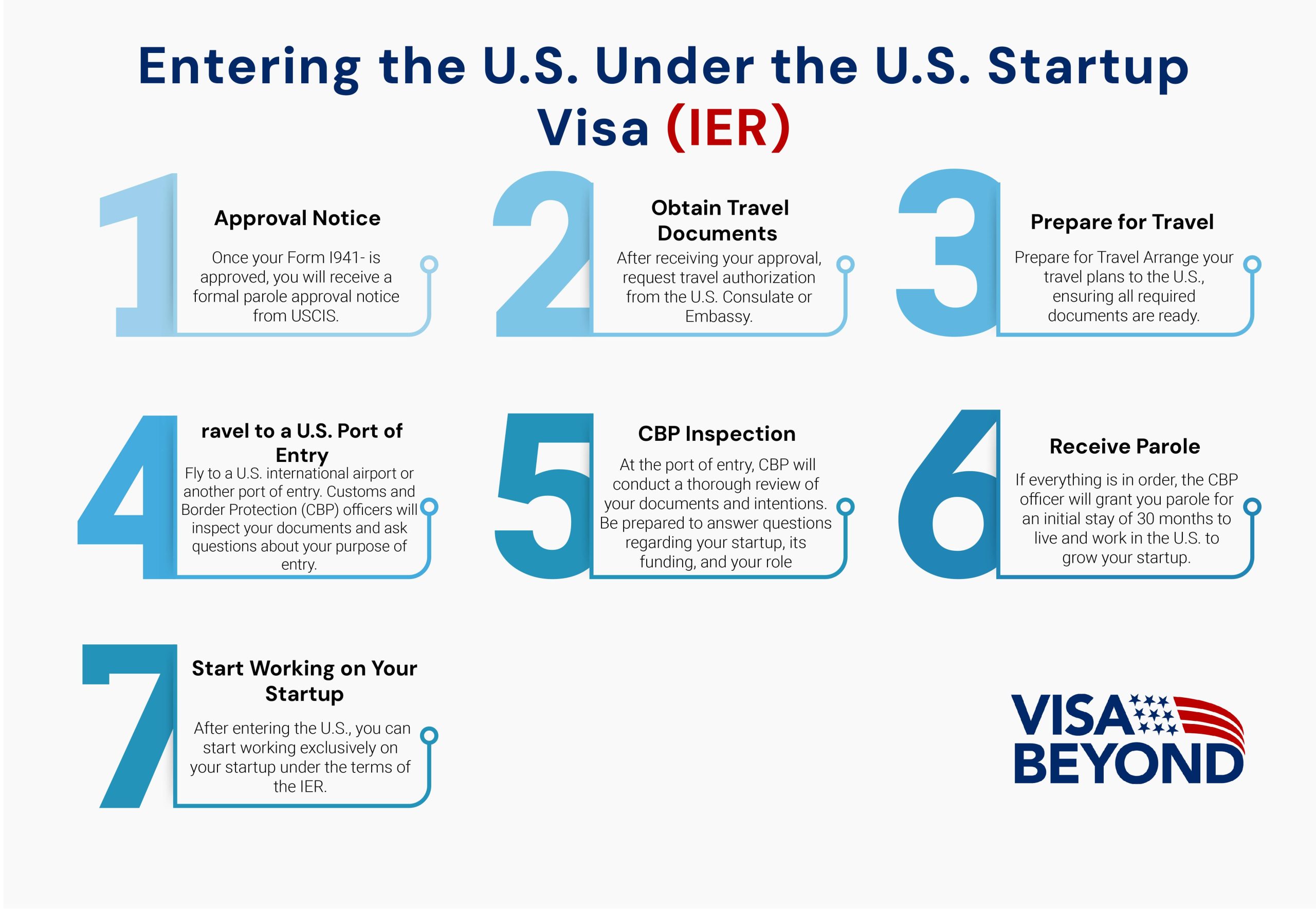
How to Enter the U.S. Once Parole is Approved
After receiving approval, follow these steps to enter the U.S.:
- Obtain Travel Documents: USCIS will provide instructions on obtaining travel documents.
- Travel to the U.S.: Once your documents are ready, you can travel to a U.S. port of entry (airport, land border, etc.).
- Customs and Border Protection (CBP) Inspection: You’ll undergo inspection by CBP officers who will decide whether to allow entry under parole.
U.S. Consulate Procedures for Entrepreneurs
If you’re outside the U.S. after parole is approved:
- Visit the Nearest U.S. Consulate: Bring your approval notice and identification.
- Request Travel Authorization: You’ll receive travel authorization to enter the U.S. under parole.
- Prepare for Entry: Make sure you have all required documents and proof of your startup’s status.
Entering Through a U.S. Port of Entry
At the port of entry:
- Present Your Documents: Show your parole approval and travel documents to the CBP officer.
- Answer Basic Questions: Be prepared to answer questions about your startup and role.
- Receive Parole Stamp: If approved, you’ll receive a stamp allowing you to stay in the U.S. for 30 months.
Can I Work for My U.S. Startup?
Yes! Once paroled into the U.S., you’re authorized to work exclusively for your startup. However, you cannot work for any other employer.
Work Authorization for Spouses Under IER
Your spouse can apply for work authorization using Form I-765 (Application for Employment Authorization). Once approved, they can work for any employer in the U.S.
Key Points:
- Spouse Eligibility: Work authorization is available to spouses of entrepreneurs paroled under the IER.
- Processing Time: Typically takes 90-120 days after filing Form I-765.
US Startup Visa Parole Renewal
You can extend your stay under parole for an additional 30 months if your startup meets certain conditions.
How to Extend Your U.S. Startup Visa After 30 Months
To renew your parole:
- File for Renewal: Apply at least 90 days before your current parole expires.
- Submit Updated Documents: Provide updated proof of startup ownership, funding, and job creation.
- Await USCIS Decision: If approved, you’ll receive an extension for another 30 months.
What Proof of Business Growth Do You Need?
You’ll need to show that your startup is growing and creating jobs. This can include:
- Revenue Growth: Sales figures and financial statements.
- Job Creation: Proof of U.S.-based hires.
- Funding: New rounds of investment or additional grants.
What Happens If Your Startup Fails?
If your startup fails, you may not be eligible for renewal, and your parole could end. You can:
Let’s Make Your U.S. Dreams a Reality.
Limitations of the U.S. Startup Visa
While the IER provides a path for entrepreneurs, there are limitations.
Can the U.S. Startup Visa Lead to a Green Card?
No, the IER does not offer a direct path to a green card. However, you may pursue other options to adjust your status.
Since parole is temporary, it does not lead to permanent residency. You must transition to another visa if you want a green card.
Can You Transition to Other Visa Types?
Yes, once your business grows, you may transition to other visa types such as:
How to Switch from IER to EB-2 National Interest Waiver
If your startup contributes significantly to the U.S. economy, you can apply for an EB-2 NIW. This is ideal for entrepreneurs whose work benefits the nation.
Example: A startup that creates new jobs in a struggling community might qualify for an EB-2 NIW.
How to Qualify for an EB-5 Investor Visa
If you invest $1.05 million (or $800,000 in targeted areas) and create at least 10 jobs, you can apply for the EB-5 Investor Visa, which offers a path to a green card.
Switching to an H-1B Visa After IER
If your startup has grown, you may be able to sponsor yourself under an H-1B visa if you meet the specialty occupation requirements. This visa allows you to stay and work in the U.S. beyond parole.
Alternatives to the US Startup Visa
If the U.S. Startup Visa (IER) isn’t the right fit for your business or you don’t qualify, there are several other visa options for entrepreneurs to consider.
Comparison of E-2 Investor Visa vs. IER
E-2 Investor Visa requires a substantial investment and is limited to nationals of treaty countries, while the IER is available to entrepreneurs of any nationality with a focus on innovation and external U.S. funding.
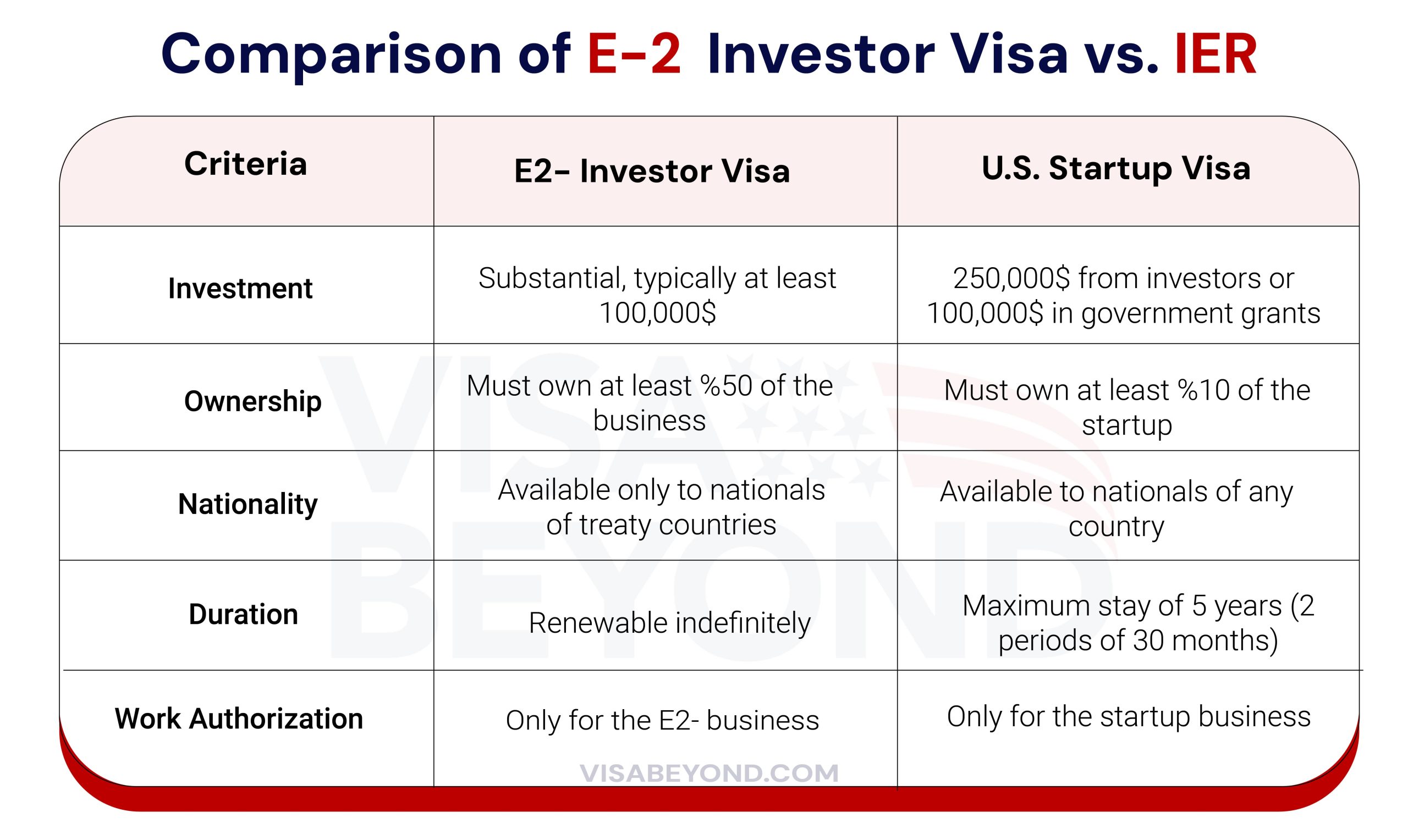
Why IER is a Strong Option for Entrepreneurs
The Startup Visa offers a unique opportunity for entrepreneurs to bring their innovative ideas to the U.S., giving them access to a thriving ecosystem of investors, talent, and markets. With its focus on startup potential rather than traditional visa barriers like nationality or large investment amounts, this pathway is ideal for those looking to scale rapidly and create significant economic impact. It provides a flexible route for entrepreneurs to establish a presence in one of the world’s most competitive economies, all while opening doors for future visa opportunities based on the success of their business.
Latest News.
From the blog

-
- Posted by Alvez

-
- Posted by Alvez
"*" indicates required fields
